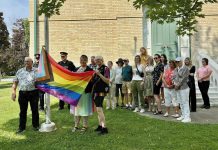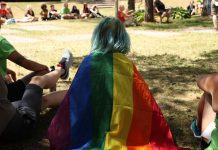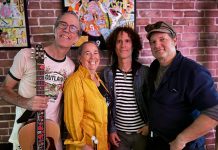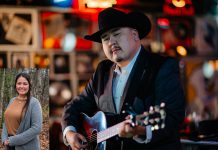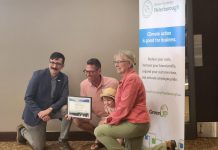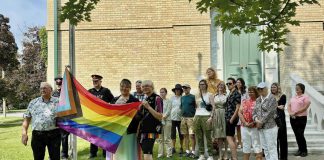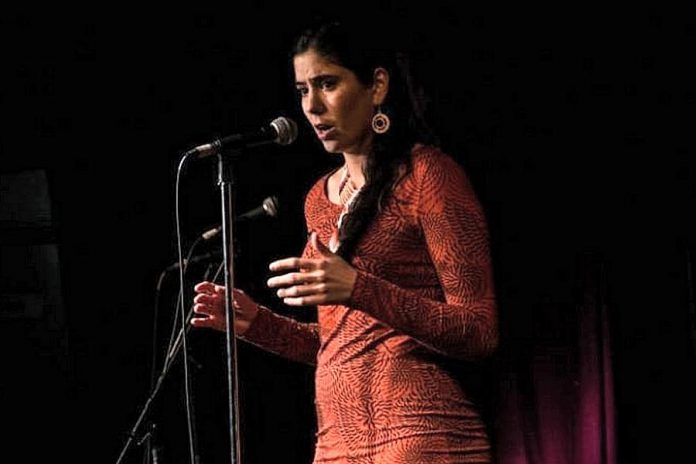
Rebecca Thomas is creating social change, one poem at a time.
When dabbling in writing as a teenager, Thomas had no notion that decades later her poetry would be used as a platform to explore identity, conflict, politics, and what it means to be young and Indigenous in Canada.
An award-winning spoken-word poet, Thomas draws on personal experience when composing her monologues to demand attention on charged social issues — like cultural appropriation, inequality, racial injustice, and healing historic wounds.
Her writing is a spark in the Indigenous struggle for equity and significantly influenced by history and her family, she says. Her dad is a survivor of addiction and the residential school system.
“Indigenous people have had their voices silenced for a long time,” says Thomas, a senior consultant for diversity and inclusion for the province of Nova Scotia. “You hear interpretations of our experiences, but you never hear directly from us.”
Inspired by hip hop culture and born in Chicago in the 1980s, slam poetry is a spoken performance of poems that is often emotive and emphatic.
“My poetry is very vulnerable and raw,” she says. “I don’t mince words. It’s not a performance — it’s me, my happiness, my frustration, my anger, and my sadness on full display.”
Slam poetry has much power in its lines to make people take note of issues it raises, says Thomas, who led the Halifax Slam Poetry team three years in a row, taking HaliSlam to the semi-finals in 2016.
VIDEO: “Matoax” – Rebecca Thomas
When she’s on stage speaking straight from the heart about her life experiences and Indigenous culture, it can be shocking and uncomfortable for many people, she notes, at times dredging up ignorant and racially fuelled hate. She hopes her poetry will draw her audience in to stand with and not against her.
“I write about Indigenous history and perspective,” Thomas says. “I often call on people to be better and become active in making our community a better place. I want people to think for a moment that their perspective as a non-Indigenous person isn’t the only perspective.”
Thomas, a Mi’kmaw, grew up in Riverview, New Brunswick, and is a member of the Lennox Island First Nation, P.E.I. She completed her masters of social anthropology at Dalhousie University. What shaped her sense of being a Mi’kmaw person didn’t come from growing up on reserve, she says, but through her experience with Indigenous communities while attending university in Halifax.
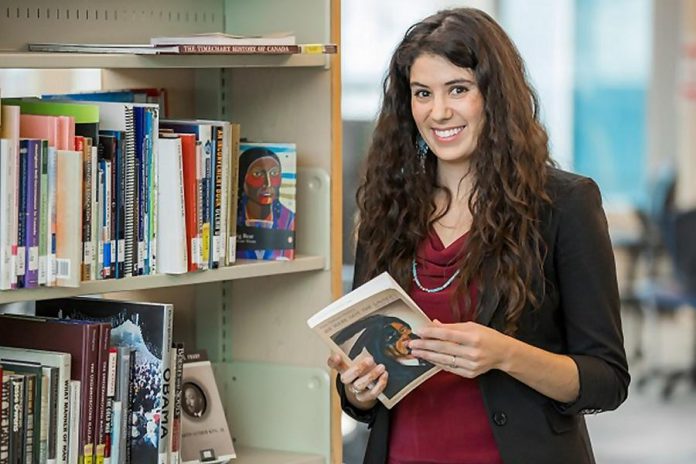
Working at the Mi’kmaw Native Friendship Centre and attending Dalhousie’s Native Education Counselling Unit brought Thomas together with other Indigenous people.
“It was at these urban indigenous hubs where I was meeting people like me,” she recalls. “It was wonderful and validated my experience. I also learned that the majority of Indigenous people live in urban centres which really helped me feel secure in saying who I was.
“A lot of my experiences came from understanding that my Indigenous background was just as valid had I grown up on a reserve. For a while, I saw myself as less than someone who didn’t grow up on a reserve because I don’t speak the language, drum, or dance.”
Thomas notes it was during her time at Dalhousie University that she learned her father’s story was her story, too. This fuelled her motivation to foster spoken word poetry as a way to give marginalized communities a voice, to inspire social change and positive action.
“The more I learned about my culture, the more I became enraged. What was taken from my dad was also taken from me. So I started getting involved with activism and working towards getting an Indigenous voice out there. As an Indigenous woman who speaks out, there is often backlash and something I’ve been navigating and trying to persevere.”
As Halifax’s poet laureate until last spring — the first Indigenous person to hold the role — Thomas used her time in that role to speak out about social issues and spur change, much like her predecessors El Jones and Tanya Davis.
She wrote a poem called “Not Perfect” about Halifax founder Edward Cornwallis and performed it at City Hall as part of her laureate duties. Her words prompted Halifax’s regional council to reopen debate over how the city commemorates its controversial founder, who had issued a bounty on the scalps of Mi’kmaw men, women, and children (his statue was later removed from a downtown park).
VIDEO: “Not Perfect” – Poet Laureate Rebecca Thomas at Halifax Regional Council in 2017
During a Canada 150 celebration last year, Thomas took to the stage to address colonial oppression in the poem, “What Good Canadians Do”.
Thomas will deliver her melodic and powerful spoken word poetry to women in Peterborough-area women as one of two keynote speakers at the third annual International Women’s Day Conference, hosted by Thirteen Moons Wellness, that takes place on Friday, March 8th at the Ashburnham Reception Centre in Nogojiwanong/Peterborough.
Propelled by her own experiences, Thomas will speak on how softness can be just as sharp as an edge. She says even though having a thick skin allows a person to have a secure enough sense of themselves so that they don’t feel constantly at risk, being soft is a different kind of heroism that is often overlooked — noting that we need to be kind and move from defensiveness and take a chance on being vulnerable.
“Softness is often seen as passive or ineffective, but I think it has a real power. It takes incredible strength to maintain softness; it’s not a weakness. If you want to be soft, then be soft. It’s okay. But, if you need to be hard to protect yourself, that’s okay, too.”
Don’t miss your chance to hear Thomas speak at International Women’s Day Conference Peterborough. For more information about the conference and to register, visit www.iwdptbo.ca.


